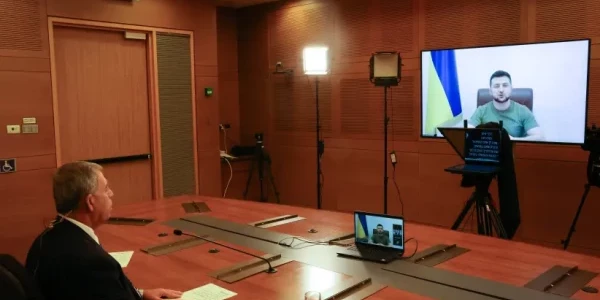Zelensky strikes the wrong note to bring Knesset to his side - analysis
20/03/2022 | Na stronie od 20/03/2022

Knesset Speaker Mickey Levy (Yesh Atid) addressing Ukrainian President Volodymyr Zelensky, March 20, 2022. (photo credit: NOAM MOSKOVITZ/KNESSET)
Source: The Jerusalem Post
Comparing the situation in Ukraine to the Holocaust did not have the effect that Ukrainian President Volodymyr Zelensky apparently had hoped for.
By LAHAV HARKOV
Ukrainian President Volodymyr Zelensky’s virtual tour of Western parliaments has gone off mostly without a hitch. He referenced Winston Churchill to Westminster and Martin Luther King Jr. to Capitol Hill. The Ukrainian-to-English translator in Brussels broke down in tears translating his plea for help.
Zelensky continued his practice of customizing his speeches to suit his audience when he addressed the Knesset over Zoom, taking the comparisons he had already made between his country’s situation and World War II to the next level and dedicating the lion’s share of his speech to the Holocaust.
That comparison did not have the effect Zelensky apparently had hoped for.
Rather than stir Israel’s leaders and legislators to action and solidarity, the heavy Holocaust comparisons – from saying Moscow is planning a “final solution for the Ukrainian question” to saying that Israel should save Ukrainians like Ukrainian Righteous Among the Nations saved Jews – drew more focus from its audience, which criticized its inappropriateness, than Zelensky’s appeal for weapons.
“I appreciate the President of Ukraine and support the Ukrainian people in heart and deed, but it is impossible to rewrite the terrible history of the Holocaust,” Communications Minister Yoaz Hendel tweeted. “Genocide was also committed on Ukrainian soil. The war is terrible, but the comparison to the horrors of the Holocaust and the final solution is outrageous.”
Asked about the tweet, Hendel said that he did not judge Zelensky’s behavior in a time of crisis, and he accepted Zelensky’s criticism of Israel and calls for Jerusalem to send weapons, but he felt he had to set the historical record straight.
Former cabinet minister Yuval Steinitz, now a Likud MK, went so far as to say, “If Zelensky’s speech was given... in normal [non-war] times, we would have said it bordered on Holocaust denial... Every comparison between a regular war, as difficult as it may be, and the extermination of millions of Jews in gas chambers in the framework of the Final Solution, is a total distortion of history. The same is true for the claim that Ukrainians helped Jews in the Holocaust... The historic truth is that the Ukrainian people cannot be proud of its behavior in the Holocaust of the Jews.”
“None of that changes the fact that despite the outrageous use of the Holocaust, we must continue humanitarian aid to the citizens of Ukraine suffering from the war and pray for its end to come soon,” he added.
Religious Zionist MK Simcha Rothman took issue with Zelensky’s reference to Ukrainians who saved Jews and tweeted: “I don’t understand Ukrainian, but if the translation I heard is accurate, Zelensky asked us to treat the Ukrainians like they treated us 80 years ago. I’m sorry, but I think we will have to reject that request. We are, after all, a moral nation.”
Israelis know the history of the Holocaust very well. The Ukrainian Auxiliary Police rounded up Jews to be massacred in Babyn Yar, Lviv and Zhytomyr. About 80,000 Ukrainians volunteered for the SS, compared with 2,600 Ukrainians documented as having saved Jews. And before that, some of the worst pogroms in Jewish history were perpetrated in what is now Ukraine.
None of that should matter in 2022, when Russia invaded Ukraine and is brutally bombarding its civilian centers. And, in fact, Israeli public opinion is strongly in favor of Ukraine in this war despite its bloody, violent history with Jews.
But Zelensky is the one who brought up the Holocaust and struck the wrong note with the Knesset, disturbing his audience rather than inspiring solidarity.
That emphasis distracted from Zelensky’s calls for more help from Israel, to which few in the political field responded publicly.
Diaspora Affairs Minister Nachman Shai continued calling for Israel to do more to help Ukrainian refugees.
“It’s natural that [Zelensky] focused on military supplies and less on the refugee issue,” he said. “We must listen to his words, to his desperate call. Israel did and does a lot for Ukraine in humanitarian aid and in absorbing refugees.”
But when it comes to actually sending weapons or defensive systems like the Iron Dome – which Zelensky asked for despite Israel not being able to send it for technical reasons, and it being unlikely to help Ukraine much, anyway – there is consensus in the cabinet that Israel should not get involved in that way, a cabinet minister said.
The main reason for this, discussed at length in these pages, is Russia’s major presence over Israel’s northern border in Syria.
Ukrainian officials have repeatedly made demands of Israel that are not possible, such as to ban Russian channels that aren’t even broadcast in Israel or to place sanctions on Russian officials in ways that Israeli law does not allow, a cabinet minister said, adding that Zelensky missed an opportunity to bring up more realistic requests.
Zelensky’s criticism of Prime Minister Naftali Bennett’s mediation contrasted with his recent expressions of appreciation for the efforts, and his saying that Bennett is taking a middle ground “between good and evil” could deter Bennett from continuing his involvement.
At the same time, about 1,000 Israelis gathered to watch the speech with Ukrainian flags and anti-Putin signs in Tel Aviv’s Habima Square, expressing support for Zelensky and the Ukrainian cause.
Zelensky will likely continue to enjoy the support of Israelis, despite the speech falling flat. But that same misfire will likely allow the government to continue its policies toward Ukraine without much public pressure to change them.